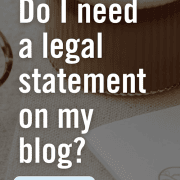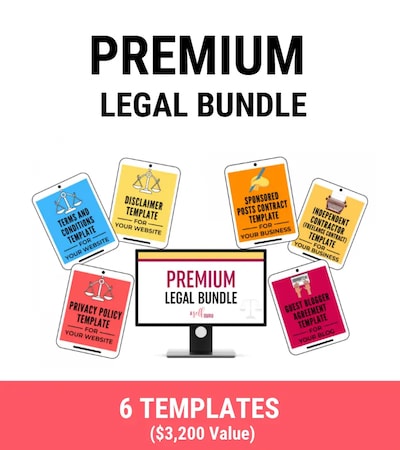Do I need a legal statement on my blog? how To write one?

“Do I need a legal statement on my blog?” It’s something many bloggers should wonder about. Let me tell you, you are asking a very good question.
The answer is yes, every website owner needs to have a legal statement on their website. In this guide, I will show you which ones you need.
As an affiliate partner of various brands and sponsored content, HerPaperRoute may earn commission on qualifying purchases. Disclaimer
It is your legal responsibility as a website owner to have all of the proper disclosures and legal statements on your website, to comply with international laws.
Don’t worry – it’s very simple to get these legal statements set up, and we have some lawyer-drafted legal page templates you can use for each required page.
Do I need a legal statement on my blog?
Now that you know that yes, you need a legal statement on your blog, let’s discuss the specific legal statements and pages you must have.
1. Affiliate Disclosure (On-Post Blurb)
Do you promote other people’s/brand’s products or services on your blog in exchange for money? Then you need to comply with FTC regulations and disclose that you were paid (sponsored) or earn commission on sales.
This disclosure can be a simple sentence, but it must appear on every blog post, above the fold.
Something like: “We use affiliate links, and may earn commissions on successful sales (link to your disclosure page)”
I’ll explain what a disclosure page is in a moment.
But first and foremost, know that to comply with the Federal Trade Commission (FTC) regulations your disclosure must be:
- Clear. A clear disclosure could be as simple as “(paid link)”, “#ad”, or “#CommissionsEarned”.
- Conspicuous. It should be placed near any affiliate link or product review in a location that customers will notice easily.
2. Amazon Associates Disclosure
If you are an Amazon Associate (affiliate) then you are required to include Amazon’s affiliate disclosure, to both your affiliate disclosure on-post blurb, and your disclosure page.
Amazon requires that it says “As an Amazon Associate I earn from qualifying purchases.”
3. The three Legal Pages To Add To Your Blog – and how to write them
Now let’s discuss the three pages you must have on your website.
Note, to help you with this, I recommend that you get the Legal Bundle which includes done-for-you templates for each of these required pages, created by a lawyer.
Privacy Policy Page
First and foremost, you need to have a privacy policy page. This page clearly outlines how you collect and use emails and user data, with scientific statements about email laws like GDPR and CCPA.
Disclosure Page
Next, you must have a disclosure page that explains how you earn from affiliate links, sponsored content and more.
Terms and Conditions Page
Your terms and conditions page states how you process payments, handle refunds and generally protect yourself from legal issues.
Do I need a legal statement on my blog – Conclusion
Yes, you must have these legal statements and pages on your blog, in order to comply with the law.
You do not want to put yourself at risk for huge fines.
Don’t risk it! Get the legal bundle now! Save 20% until May 23 with code Herpaperroute20

Follow along on Instagram!










